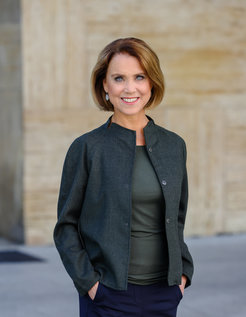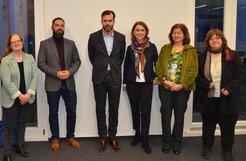Understanding criminal minds to prevent criminal behavior
Minister of Science Visits the Max Planck Institute for the Study of Crime, Security and Law in Freiburg
Petra Olschowski, Baden-Württemberg’s Minister of Science, Research and the Arts took a closer look at research facilities in Freiburg and visited the Max Planck Institute for the Study of Crime, Security and Law. The Institute is an internationally well-known hub for researchers in the legal and social sciences.

Baden-Württemberg’s Minister of Science Petra Olschowski visited the Max Planck Institute for the Study of Crime, Security and Law on February 15th, together with Daniela Evers, member of the state parliament, and Anke Wiedemann and Karim Saleh, both members of Freiburg city council. The guests were greeted by the Institute’s managing director Professor Tatjana Hörnle. During the approximately two-hour visit, criminal law expert Professor Hörnle and her co-director Professor Jean-Louis van Gelder talked to the visitors about the research activities of all three departments at the Institute: criminal law, public law, and criminology.
Researchers in the Department of Criminal Law, headed by Tatjana Hörnle, analyze the assumptions and basic principles of criminal law, and they discuss the adequate scope of prohibitions and sanctions in the context of socially and culturally fragmented societies. Another area of emphasis is the law of sexual offenses, the reform of which she has played a major role in shaping in recent years.
The Department of Public Law addresses fundamentals questions of constitutional law, administrative law, and public security law. It explores how the legal system can respond to dangers in order to prevent security threats and criminal acts as far in advance as possible. The department is headed by co-director Professor Ralf Poscher, who previously held a professorship at the University of Freiburg (he has been an honorary professor there since 2019).
Empirical criminology - How do criminals make their decisions?
In the Department of Criminology, studies and experiments using virtual reality and other new technologies are carried out to identify the individual predispositions and environmental factors that lead individuals to commit a crime. Just last summer, the Institute opened a research lab designed especially for this purpose: the MAXLab in Freiburg. It is considered the first independent research lab of its kind worldwide for criminological research by means of virtual reality. "In our specific field of criminology, we put a strong focus on experimental research," said Jean-Louis van Gelder, head of the Department of Criminology. According to van Gelder, the objective of empirical criminology is to learn more about how criminals make their decisions and what goes through their minds when they are committing a crime.
The visit also included a guided tour of the library, which is the heart of the Institute. Containing over 500,000 printed volumes, it is one of the largest specialized libraries for criminal law and criminological literature in the world. "If you were to put all our bookshelves in a row, the line of books would be 17 kilometers long," explained library head Elisabeth Martin.
During her visit, Petra Olschowski emphasized the importance of the Institute for society at large. "In addition to pursuing fundamental research, the research institute also takes an interdisciplinary approach that combines aspects of legal science with those of social science. By looking at how certain crimes can be prevented, for example, the researchers here are making an important contribution to resolving some of society’s most pressing issues," said the Minister of Science.
"Freiburg is an outstanding research location and covers a broad spectrum of research," added Daniela Evers, member of the state parliament. "The Max Planck Institute for the Study of Crime, Security and Law stands out among the range of research institutes because of its unique profile featuring a combination of legal science, social science, and behavioral science. Politics and society need science to remain well-informed and objective." The Institute delivers "findings at the highest scientific level and paves the way for the country’s domestic and legal policy."

Founded in the 1960s, the Max Planck Institute for the Study of Crime, Security and Law (known as the "Max Planck Institute for Foreign and International Criminal Law" until 2020) conducts basic research in the fields of criminal law, public security law, and criminology. Today, more than 100 scientists from all over the world are conducting research at the Institute, primarily from the disciplines of law, sociology, psychology, and criminology. The research approach is interdisciplinary and application-oriented. It is not uncommon for the results to be incorporated into new laws and serve in the training of the police and judiciary.
The Max Planck Institute in Freiburg is part of the Max Planck Society with its almost 90 institutes (13 of which are in Baden-Württemberg), making it the international flagship for German fundamental research. The Society currently counts 30 Nobel laureates among its ranks.
Petra Olschowski has been Minister for Science, Research and the Arts in Baden-Württemberg since September 2022. The Green Party politician previously served as state secretary in the Ministry of Science, Research and the Arts for several years. Born in Stuttgart, she is regarded as an outstanding expert on the performing arts and the arts scene.
Daniela Evers has been representing the constituency of Freiburg I as a member of Baden-Württemberg’s state parliament since 2021. She is the legal policy spokesperson for the Green Party and is also the prison commissioner and chairwoman of the Justice and Migration Working Group.
Anke Wiedemann represents the Green Party on Freiburg’s city council. She is a political scientist and ethnologist now working for the rector’s office of the University of Freiburg.
Karim Saleh also represents the Green Party on Freiburg’s city council. Saleh, a graduate of Islamic and religious studies, is very active in child and youth work as a volunteer.

